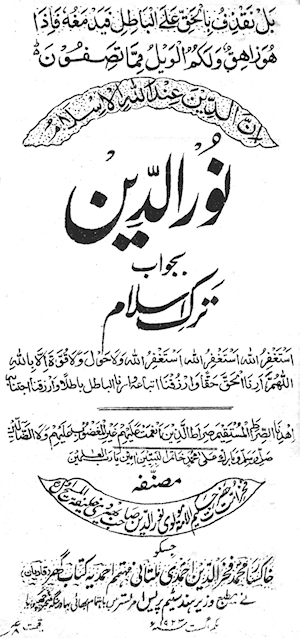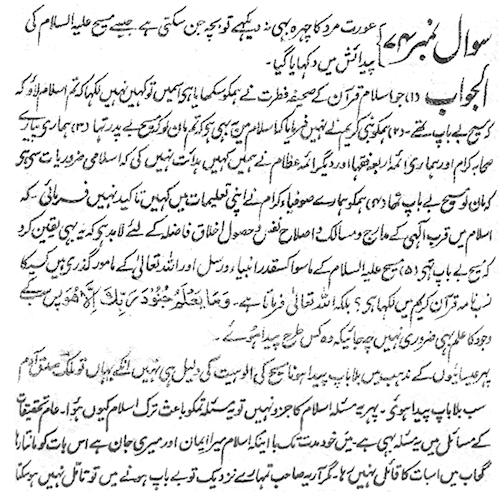Showing Islam is Peaceful • Tolerant • Rational • Inspiring
| Home
|
| 1.
Islam |
| 2.
Ahmadiyya Movement Hazrat Maulana Nur-ud-Din Hazrat Maulana Nur-ud-Din’s view on the birth of Jesus |
| 3.
Publications & Resources |
Hazrat Maulana Nur-ud-Din’s view on the birth of JesusHazrat Maulana Nur-ud-Din wrote a book entitled Nur-ud-Din in refutation of a book Tark-i Islam (‘Leaving Islam’) written by a former Muslim who left Islam to become an Arya Samaj Hindu. In the book Tark-i Islam the author had listed a large number of objections against the Quran which, he said, were the cause of his leaving Islam. One of his reasons for leaving Islam (no. 74 in his list) was that it teaches that:
Replying to this, Hazrat Maulana Nur-ud-Din wrote:
This book, the full title of which is Nur-ud-Din bi-jawab Tark-i Islam, was published from Qadian in 1904. News of its publication was announced in Badr, 1 March 1904 (p. 8, foot of col. 3). In the book itself, the Hazrat Maulana writes on p. 184: “Today is 11th December 1903”. According to Badr, dated 24 February 1904, the name of this book as Nur-ud-Din was chosen by Hazrat Mirza Ghulam Ahmad (see p. 7, foot of col. 1). It is abundantly clear from this extract that its writer, Maulana Nur-ud-Din, believes that it is not a prescribed doctrine of Islam, anywhere at all, that Jesus was born without a father. However, Sir Muhammad Zafrullah Khan, the prominent writer and scholar of the Qadiani Jama‘at, writes as follows in his biography of Maulana Nur-ud-Din:
Sir Zafrullah appears to draw this conclusion from the Maulana’s words in the above quotation: “I myself, even though Islam is my faith and my life, held this view for a long time, but I do not hold it now.” But his conclusion is plainly and obviously wrong, as we show below. The objector gave it as a reason why he left Islam that, as a Muslim, he was required to believe that Jesus was born without needing to have a father. The Hazrat Maulana replied that there is no authority in Islam which requires a Muslim to hold this belief as a part of Islam. Therefore he asks the objector: how can you give it as a reason for leaving Islam? He goes on to say that this issue (whether Jesus was born without a father) is a matter to be determined by research and not on the basis of any religious doctrine. Now after telling the objector all this, it would be quite absurd for the Hazrat Maulana to add that he himself used to believe that Jesus had a father but now he holds that Jesus was born without a father. If the Qadiani Jama‘at conclusion is correct, it would mean that Hazrat Maulana Nur-ud-Din is saying that he no longer considers his points number (1) to (5) to be true. If so, then why is he putting them forward in the first place? And why does he not then say that he has now found such and such authorities in Islam which do require Muslims to believe as a part of Islam that Jesus had no father? On the other hand, the Qadiani Jama‘at may say that the Hazrat Maulana still regarded his points number (1) to (5) to be valid, but he had personally come to realize that Jesus had no father. But this means at least that, according to the Hazrat Maulana, it is allowed in Islam to hold the belief that Jesus had a father. Why then does the Qadiani Jama‘at constantly raise it as an objection that the Lahore Ahmadiyya Jama‘at holds the belief that Jesus had a father? The meaning of the Hazrat Maulana’s words “I myself, even though Islam is my faith and my life, held this view for a long time, but I do not hold it now” is, in fact, the opposite of what the Qadiani Jama‘at has suggested. He clearly means that he used to believe that Jesus was born without a father, the belief which has driven the objector out of Islam, and that he saw no inconsistency in holding this belief with being a Muslim, but he does not hold this belief now. Despite Islam being his faith and his life, he has come to believe that Jesus did have a father. Some years later, when Hazrat Maulana Nur-ud-Din was Head of the Ahmadiyya Movement, in one of his Quran teaching sessions he said:
It is clear from this again that the view of Hazrat Maulana Nur-ud-Din is that Islam does not require Muslims to believe that Jesus was born without a father. Below: Title page of book Nur-ud-Din bi-jawab Tark-i Islam
Below: Image of quotation from book Nur-ud-Din
Below: Image of quotation from Ḥaqā’iq-ul-Furqān
|


